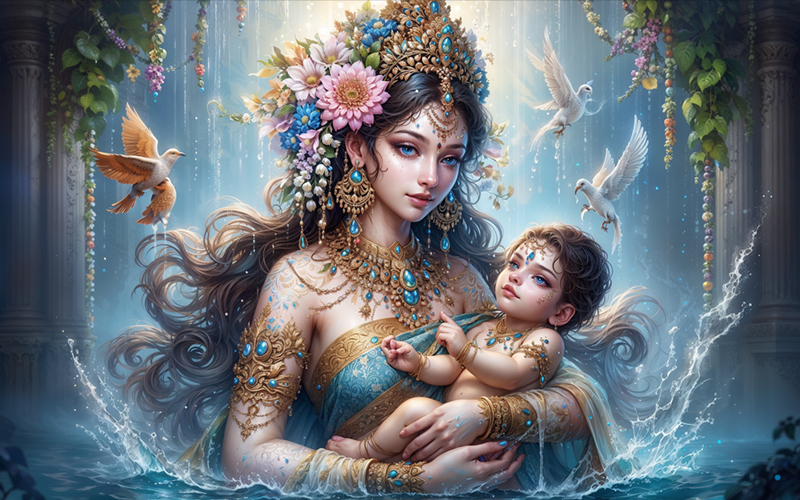Physical Address
Empirical System, 105 First Floor Pitru Krupa, Opp. R.K. Desai College, Koparli Road, Vapi (Gujarat) 396 191
Physical Address
Empirical System, 105 First Floor Pitru Krupa, Opp. R.K. Desai College, Koparli Road, Vapi (Gujarat) 396 191

In the ancient land of Bharat, the sacred river Ganga flowed, its waters holding within them tales of love, sacrifice, and destiny.
The story begins with the eight Vasus, celestial deities who once visited Earth. Among them was Dyaus (Dyou), who, along with his wife, was enchanted by the divine cow Nandini, owned by the sage Vashishtha.
Dyaus’s wife, fascinated by Nandini’s ability to fulfill any desire, convinced him to steal the cow. They took Nandini from Vashishtha’s hermitage, unaware of the sage’s powers and the consequences of their actions.
Sage Vashishtha, upon discovering the theft, was deeply angered. Using his spiritual powers, he cursed the Vasus to be born as mortals, for their offense against him and the disruption of his sacred rituals.
The Vasus, remorseful and distressed by the curse, pleaded with Sage Vashishtha for mercy. Moved by their sincere remorse, the sage mitigated his curse, decreeing that they would be liberated from their mortal lives swiftly.
To fulfill their liberation, the Vasus sought the help of Ganga, the divine river known for her purifying powers. Ganga agreed to be their mother on Earth, under the condition that she would free them swiftly from their mortal forms.
It was then that Ganga, with her divine presence and grace, caught the eye of King Shantanu of Hastinapura. Enchanted by her beauty and drawn to her celestial aura, Shantanu fell deeply in love and proposed marriage to her.
Ganga agreed to marry him under one condition: that Shantanu would not question her actions, no matter how mysterious they might seem. Entranced and captivated, Shantanu gladly accepted her condition, sealing their union in love and divine destiny.
Over time, Ganga bore Shantanu seven sons, each one a manifestation of the Vasus in mortal form. True to her word and the necessity of their release, she immediately drowned each newborn in the river Ganga, ensuring their swift liberation from mortal life.
When Ganga bore her eighth son, Shantanu, unable to bear the loss of yet another child, broke his vow of silence and questioned Ganga. In response, she revealed her divine identity and the purpose behind her actions. This son, Devavrata, was destined to live a full life due to unique circumstances surrounding his birth.
Devavrata, the eldest son born to Ganga and Shantanu, grew up under Ganga’s guidance. Known for his exceptional qualities of wisdom, valor, and dedication to dharma, he was later known as Bhishma due to a vow he took, the Bhishm pratigya, altering his name as a mark of his commitment.
The story of Ganga and her seven sons is a profound tale of sacrifice, duty, and destiny. It exemplifies the complexities of divine intervention and mortal life, setting the stage for many significant events in the epic of Mahabharata. Through their sacrifices, we learn about the enduring power of love and the ultimate fulfill ment of destiny.
Thank you for watching. Don’t forget to like, share, and subscribe for more tales from the ancient texts of Bharat.